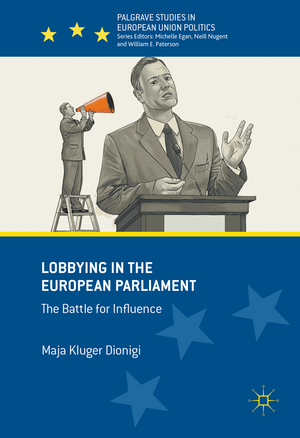Lobbying in the European Parliament: The Battle for Influence: Palgrave Studies in European Union Politics
Autor Maja Kluger Dionigien Limba Engleză Hardback – 15 dec 2016
| Toate formatele și edițiile | Preț | Express |
|---|---|---|
| Paperback (1) | 775.78 lei 43-57 zile | |
| Springer International Publishing – 4 iul 2018 | 775.78 lei 43-57 zile | |
| Hardback (1) | 781.62 lei 43-57 zile | |
| Springer International Publishing – 15 dec 2016 | 781.62 lei 43-57 zile |
Din seria Palgrave Studies in European Union Politics
- 20%
 Preț: 691.32 lei
Preț: 691.32 lei - 20%
 Preț: 691.52 lei
Preț: 691.52 lei - 9%
 Preț: 798.62 lei
Preț: 798.62 lei - 20%
 Preț: 755.99 lei
Preț: 755.99 lei -
 Preț: 282.28 lei
Preț: 282.28 lei - 18%
 Preț: 889.75 lei
Preț: 889.75 lei - 20%
 Preț: 690.39 lei
Preț: 690.39 lei -
 Preț: 243.89 lei
Preț: 243.89 lei -
 Preț: 388.72 lei
Preț: 388.72 lei -
 Preț: 388.72 lei
Preț: 388.72 lei -
 Preț: 393.52 lei
Preț: 393.52 lei -
 Preț: 392.60 lei
Preț: 392.60 lei -
 Preț: 390.25 lei
Preț: 390.25 lei -
 Preț: 390.63 lei
Preț: 390.63 lei -
 Preț: 389.70 lei
Preț: 389.70 lei -
 Preț: 387.96 lei
Preț: 387.96 lei -
 Preț: 391.61 lei
Preț: 391.61 lei -
 Preț: 391.61 lei
Preț: 391.61 lei -
 Preț: 392.60 lei
Preț: 392.60 lei -
 Preț: 386.81 lei
Preț: 386.81 lei -
 Preț: 390.63 lei
Preț: 390.63 lei -
 Preț: 386.00 lei
Preț: 386.00 lei -
 Preț: 392.60 lei
Preț: 392.60 lei -
 Preț: 388.72 lei
Preț: 388.72 lei - 15%
 Preț: 645.79 lei
Preț: 645.79 lei -
 Preț: 391.61 lei
Preț: 391.61 lei - 15%
 Preț: 645.47 lei
Preț: 645.47 lei -
 Preț: 392.21 lei
Preț: 392.21 lei -
 Preț: 386.81 lei
Preț: 386.81 lei -
 Preț: 390.63 lei
Preț: 390.63 lei -
 Preț: 390.63 lei
Preț: 390.63 lei -
 Preț: 387.75 lei
Preț: 387.75 lei -
 Preț: 389.88 lei
Preț: 389.88 lei -
 Preț: 388.52 lei
Preț: 388.52 lei -
 Preț: 391.61 lei
Preț: 391.61 lei -
 Preț: 400.26 lei
Preț: 400.26 lei -
 Preț: 387.75 lei
Preț: 387.75 lei -
 Preț: 386.81 lei
Preț: 386.81 lei -
 Preț: 388.72 lei
Preț: 388.72 lei -
 Preț: 389.88 lei
Preț: 389.88 lei -
 Preț: 391.61 lei
Preț: 391.61 lei -
 Preț: 389.70 lei
Preț: 389.70 lei -
 Preț: 386.81 lei
Preț: 386.81 lei -
 Preț: 389.88 lei
Preț: 389.88 lei -
 Preț: 388.72 lei
Preț: 388.72 lei - 15%
 Preț: 643.48 lei
Preț: 643.48 lei - 15%
 Preț: 582.63 lei
Preț: 582.63 lei -
 Preț: 398.35 lei
Preț: 398.35 lei - 15%
 Preț: 644.18 lei
Preț: 644.18 lei
Preț: 781.62 lei
Preț vechi: 953.20 lei
-18% Nou
Puncte Express: 1172
Preț estimativ în valută:
149.58€ • 155.28$ • 124.73£
149.58€ • 155.28$ • 124.73£
Carte tipărită la comandă
Livrare economică 24 martie-07 aprilie
Preluare comenzi: 021 569.72.76
Specificații
ISBN-13: 9783319426877
ISBN-10: 3319426877
Pagini: 199
Ilustrații: XV, 199 p. 3 illus., 1 illus. in color.
Dimensiuni: 148 x 210 x 18 mm
Greutate: 0.43 kg
Ediția:1st ed. 2017
Editura: Springer International Publishing
Colecția Palgrave Macmillan
Seria Palgrave Studies in European Union Politics
Locul publicării:Cham, Switzerland
ISBN-10: 3319426877
Pagini: 199
Ilustrații: XV, 199 p. 3 illus., 1 illus. in color.
Dimensiuni: 148 x 210 x 18 mm
Greutate: 0.43 kg
Ediția:1st ed. 2017
Editura: Springer International Publishing
Colecția Palgrave Macmillan
Seria Palgrave Studies in European Union Politics
Locul publicării:Cham, Switzerland
Cuprins
Acknowledgements.- List of abbreviations.- Introduction.- Chapter 1: Where, when, and how does lobbying takes place in the European Parliament.- Chapter 2: What are the conditions for interest group influence?.- Chapter 3: Regulating CO2 Emissions for vans. Is the European Parliament Still a Defender of Environmental Interests?.- Chapter 4: Food Information to Consumers Chapter 5: Regulating Working time for Self-employed Trucker Drivers.- Chapter 6: When lobbying becomes counterproductive: The maternity leave directive.- Chapter 7: Conclusion.- Bibliography.- Appendices.- Index.
Notă biografică
Maja Kluger Rasmussen is Senior Researcher at Think Tank Europa in Copenhagen, Denmark, and visiting Research Fellow at the Centre for Analysis Risk and Regulation at the London School of Economics and Political Science. She was awarded her PhD in Government by the London School of Economics and Political Science.
Textul de pe ultima copertă
This book explains when and how interest groups are influential in the European Parliament, which has become one of the most important lobbying venues in the EU. Yet we know little about the many ways in which interest groups and lobbyists influence parliamentary politics. The author offers insights on four key cases of lobbying, based on the analysis of EU documents, lobbying letters, and 145 interviews. She argues that lobbying success depends on a number of factors, most notably the degree of counter-lobbying, issue salience, and committee receptiveness. These factors are brought together in the framework of “Triple-I” - interests, issues, and institutions – to determine the success or failure of lobbying. This book will be of use to students and scholars interested in EU politics and governance, EU decision-making, and interest group politics, along with policy-makers and practitioners.
Caracteristici
Offers new insights into the dynamics of lobbying in the European Parliament Re-thinks the nature of the relationship between interest groups and EU policymakers Argues that interest group influence depends on several factors, namely interest, issues and institutions











